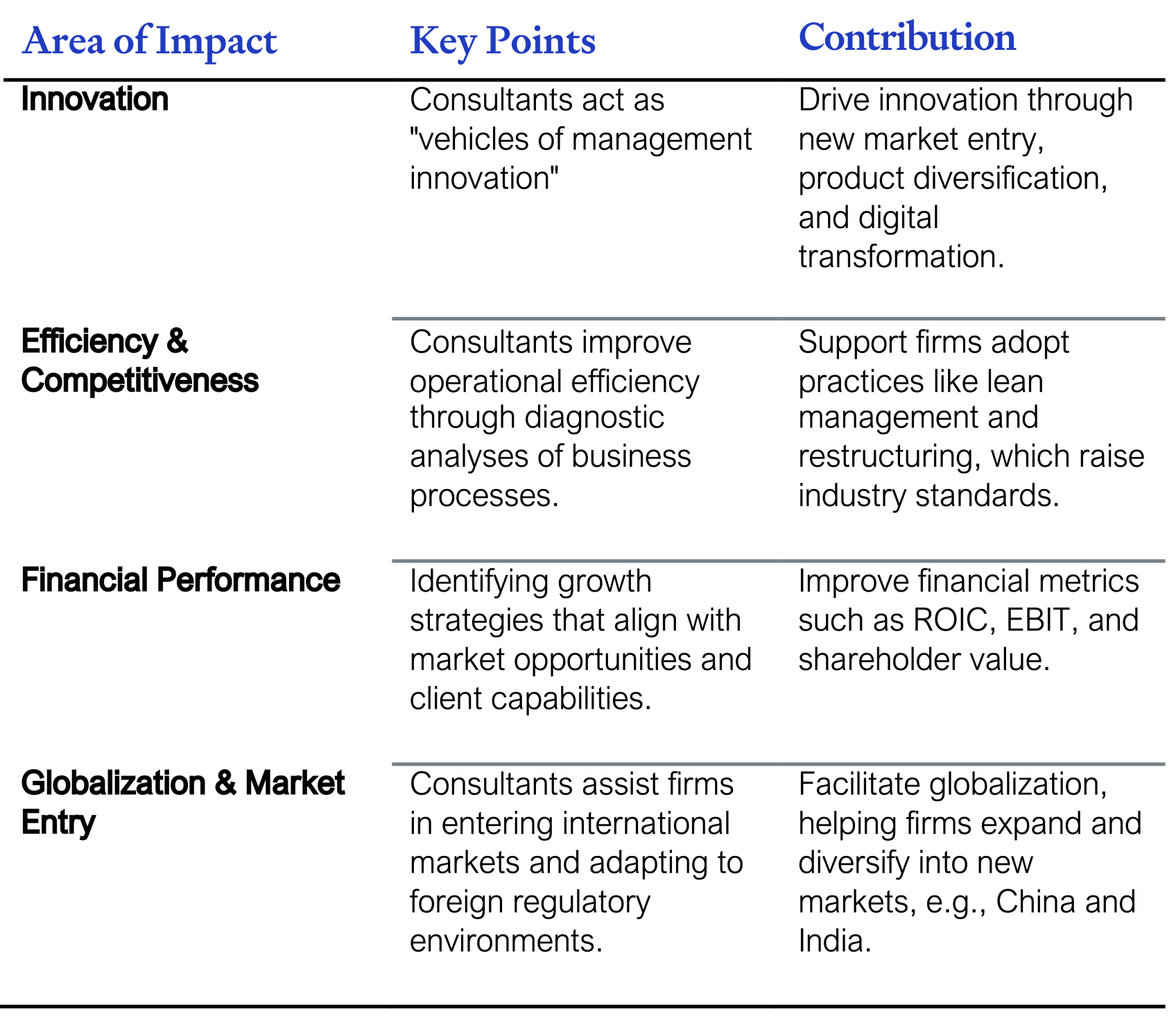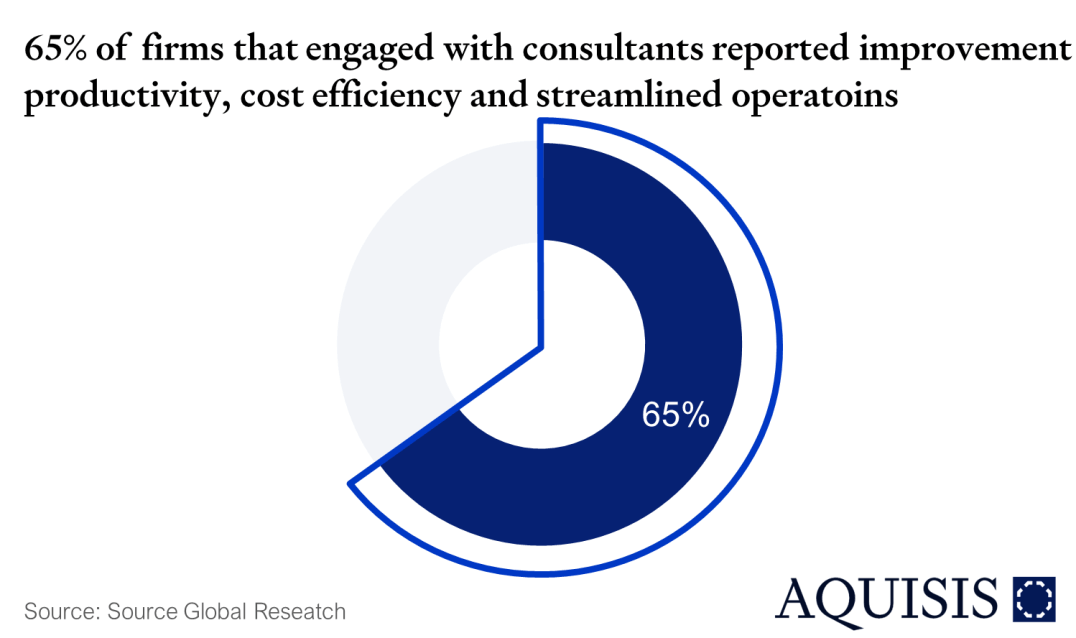
In an era where industries are confronted with unprecedented levels of complexity, competition, and technological disruption, strategy consulting remains a crucial driver of business performance and sectoral transformation. Firms increasingly rely on strategy consultants to navigate the volatile business environment, seeking not only solutions for current challenges but also long-term guidance to achieve sustainable growth. External consultants are often the architects behind major shifts in corporate strategy, influencing not only individual firms but entire industries. The role of strategy consulting, however, goes beyond assisting firms to devise strategies; it significantly impacts how industries operate, innovate, and compete. In this article, we delve into the various effects of strategy consulting on industry performance, examining the positive contributions as well as the critical debates surrounding its influence.
One of the most prominent effects of strategy consulting is its capacity to drive innovation across industries. Consultants are often at the forefront of identifying growth opportunities, whether through new market entry, product diversification, or digital transformation. Given their exposure to multiple industries and markets, strategy consultants bring fresh perspectives and cross-industry insights that spur innovation. Consultants act as vehicles of management innovation, disseminating novel managerial practices and frameworks that enhance firms' innovative capacity. Companies engaging in strategic consulting are 35% more likely to introduce disruptive innovations in the five years following an engagement. This knowledge transfer enables companies to adopt best-in-class solutions that may not be widely practiced within their sectors (Giangreco, 2011). Moreover, consultants play a vital role in diffusing cutting-edge organizational forms and practices across industries, thus raising the overall standard of innovation (Andrew Sturdy, 2009).

Beyond innovation, strategy consulting has a profound influence on operational efficiency, which in turn shapes the competitive dynamics of entire industries. A report by Source Global Research indicates that nearly 65% of firms that engaged with strategy consultants reported marked improvements in productivity, cost efficiency, and streamlined operations. Consultants typically conduct in-depth diagnostic analyses of business processes, identifying areas of waste, redundancy, and inefficiency, and recommending solutions such as lean management and restructuring.
These improvements not only enhance client firms' performance but also compel other players within the industry to adopt similar practices to maintain competitiveness, thereby elevating operational standards across the board. For instance, in the automotive industry, the widespread adoption of supply chain optimization techniques, influenced heavily by consulting firms, has led to significant industry-wide shifts towards leaner production systems and just-in-time inventory management (Christopher, 2016). As more companies integrate these practices, industries become more efficient and cost-competitive, although this may also increase pressure on smaller firms to keep pace.

Financial performance enhancement remains a key motivation for firms seeking the services of strategy consultants, with many companies expecting tangible returns in the form of increased profitability, market share, and shareholder value. Empirical studies have provided mixed but insightful findings on this front. The Harvard Business Review asserts that strategy consulting has contributed substantially to enhancing shareholder value in sectors such as pharmaceuticals and banking by identifying growth strategies that align with market opportunities and client capabilities (Clayton M. Christensen, 2013). Such consulting engagements often result in improved financial metrics, including return on investment and earnings before interest and taxes. Nevertheless, while short-term financial gains from consulting interventions are often realized, the long-term sustainability of these gains can be questionable, particularly if firms lack the internal capacity to implement and maintain the recommended strategies effectively. Therefore, while strategy consulting can boost industry profitability, its long-term impact depends heavily on execution and organizational alignment.
An often-overlooked consequence of strategy consulting is its role in standardizing strategies within industries, a phenomenon that can have ambiguous effects on competition and differentiation. As many consultants employ well-established frameworks such as SWOT analysis, Porter’s Five Forces, and the BCG Matrix, they may inadvertently guide different firms toward similar strategic solutions. This tendency is referred as the "strategy trap," whereby firms adopt convergent strategies that erode unique value propositions and lead to competitive stalemates (Martin, 2009). For example, in the banking sector, widespread digitization efforts driven by consulting advice have led to nearly identical customer experiences and product offerings among major banks, thus diminishing brand differentiation and fostering price-based competition. Although standardization can improve industry-wide quality and efficiency, it may also undermine the diversity of strategic approaches, limiting firms' ability to stand out in the market and potentially reducing the industry’s dynamism over time. It would be shortsighted to see this as evidence of a hamster wheel exercise: First movers will steel reap gains from differentiation until competitors catch up, while those who do not follow best practices will end up falling behind.
The expanding reach of strategy consulting: Empowering SMEs, driving globalization, and shaping industry futures
Associate
Managing Partner
Andreas Werr, F. P. (2007). Purchasing management consulting services—From management autonomy to purchasing involvement. Stockholm School of Economics.
Andrew Sturdy, T. C. (2009). Between Innovation and Legitimation - Boundaries and Knowledge Flow in Management Consultancy.
Clayton M. Christensen, D. W. (2013). Consulting on the Cusp of Disruption. HBR.
Giangreco, A. C. (2011). Gurus or Wizards? A Review of the Role of Management Consultants. European Management Review, 231–244 .
Martin, R. L. (2009). The execution trap. HBR.
AI Website Generator